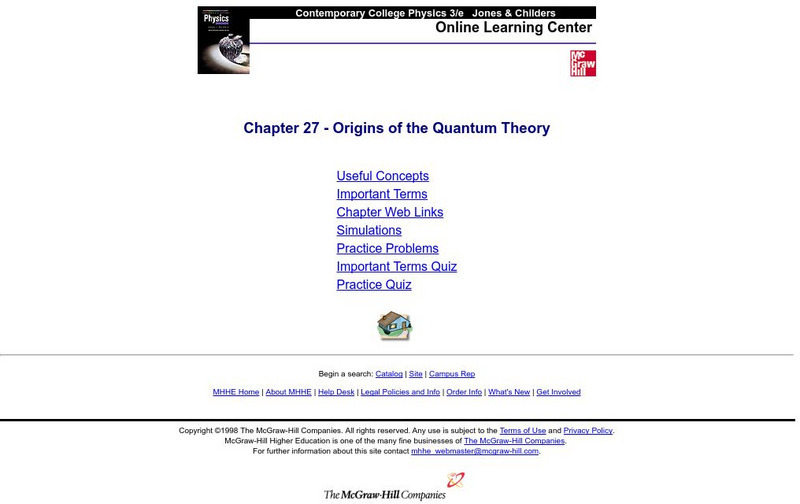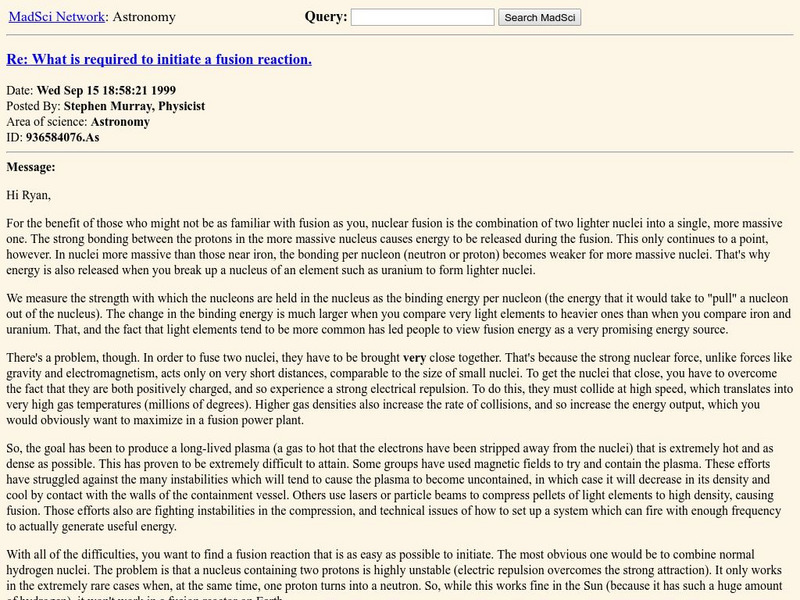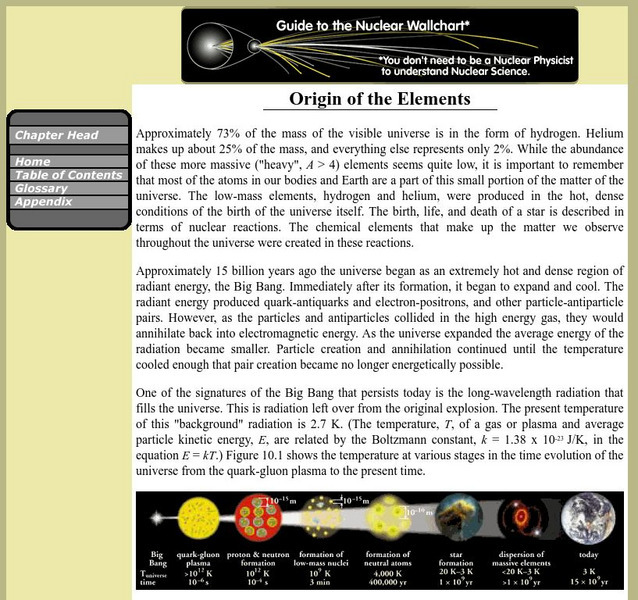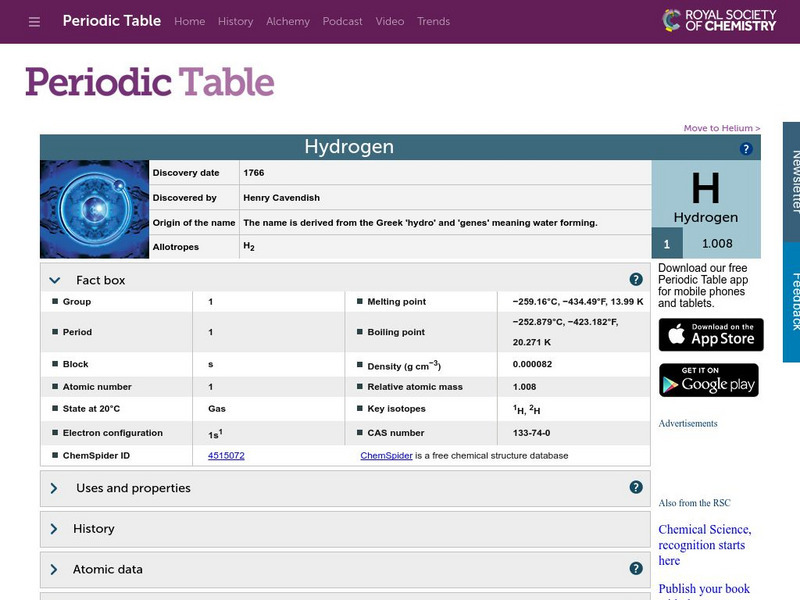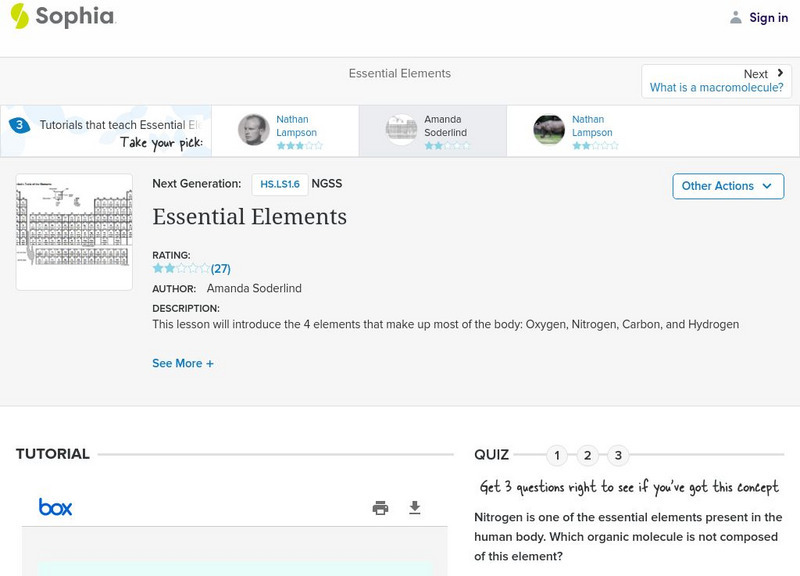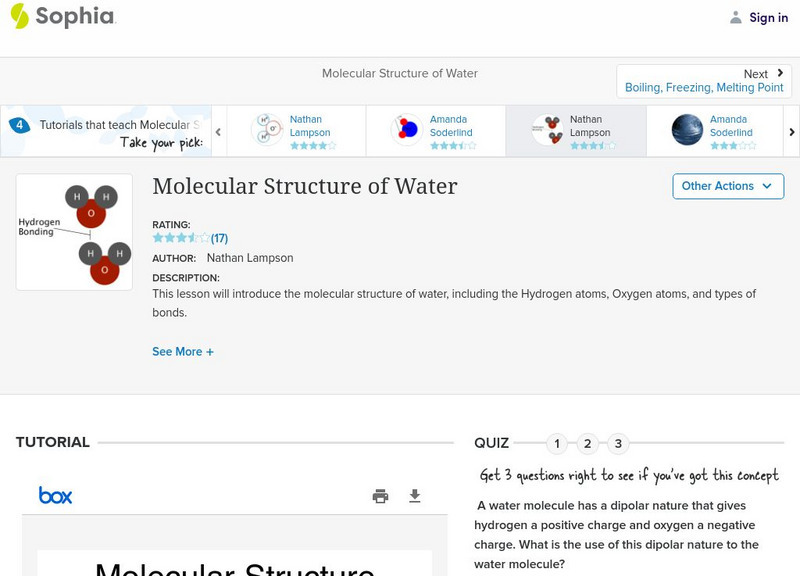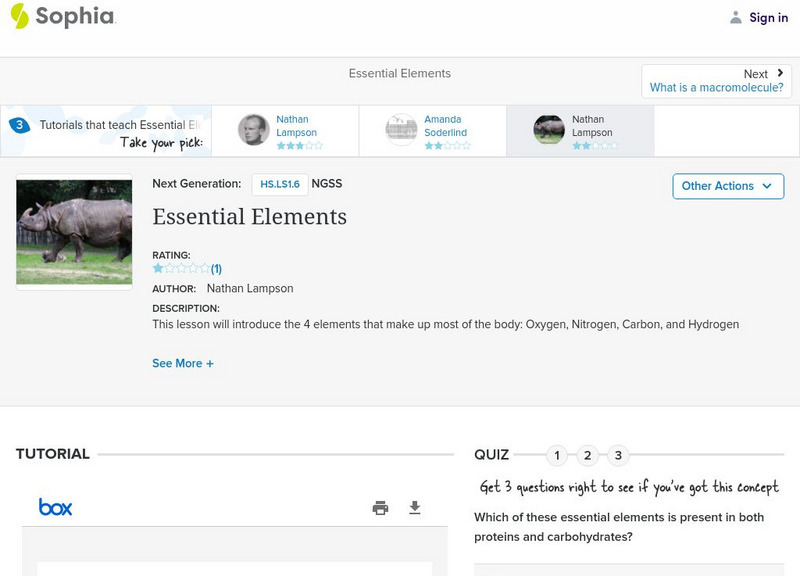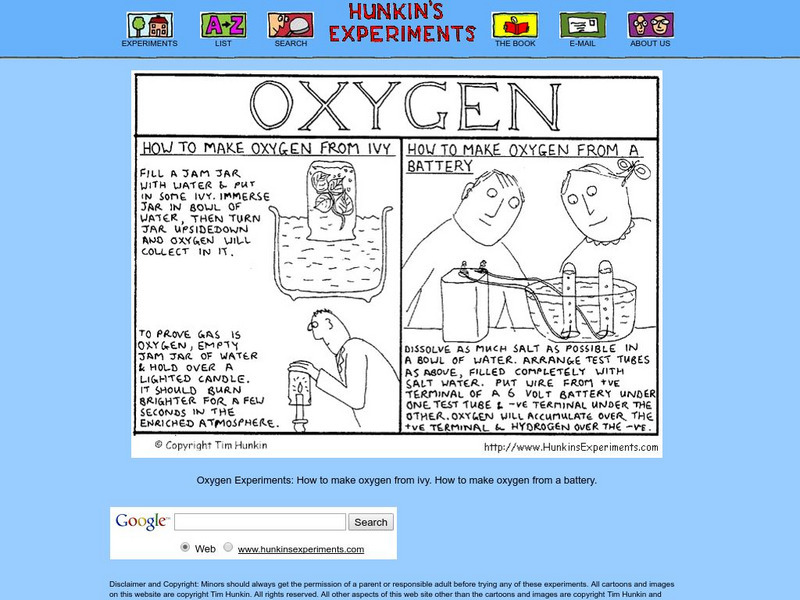Hi, what do you want to do?
Simon Fraser University
Chem1 Virtual Textbook: Origin of the Chemical Elements
As part of the General Chemistry Virtual Textbook, this site examines a variety of topics related to the elements. Topics covered in the discussion include Primordial Chemistry, Stellar nucleosynthesis, Hydrogen burning, and more.
University of Colorado
University of Colorado: Physics 2000: Bohr's Atom
An outstanding site that can best be described as student friendly. It describes the main differences between the classical and quantum models of the atom. Clear and well illustrated.
McGraw Hill
Mc Graw Hill Companies: Origins of the Quantum Theory
An indexing page for Chapter 27 (Origins of the Quantum Theory) of the companion web site for McGraw Hill's Contemporary College Physics textbook. Includes several worthy pages with chapter notes, simple definitions, online computer...
Concord Consortium
Concord Consortium: Gas Laws & Weather Balloons
This activity uses the phenomena of hydrogen-filled weather balloons and hot air balloons to explore some of the gas laws.
University Corporation for Atmospheric Research
Ucar: Hydrocarbons
Learn about "hydrocarbons", chemical compounds whose molecules are made up entirely of carbon and hydrogen atoms.
MadSci Network
Msn: What Is Required to Initiate a Fusion Reaction?
From the Mad Scientist Network web site. Using a question and answer format, this page provides a thorough discussion of fusion reactions. Fusion and fission are compared and contrasted and the mechanisms which must occur to initiate and...
Lawrence Berkeley National Laboratory
Berkeley Lab: Origin of the Elements
Discussion of the creation of the chemical elements that make up the matter we observe throughout the universe.
University of Wisconsin
The Why Files: Batteries Not Included
A good online article from The Why? Files about an inventor who is perfecting a fuel cell to operate (what else?) a cell phone. Interesting, with enough technical stuff to give it some body.
Royal Society of Chemistry
Visual Elements: Hydrogen
Short, but descriptive summary on hydrogen. Discusses this element's composition and characteristics, and includes a graphic as well.
Other
The Science House: Production of Hydrogen
In this experiment, students generate hydrogen gas and examine its properties. Teacher's notes are included.
Other
Us Peroxide
US Peroxide is the leading supplier of hydrogen peroxide and peroxygen based technologies and services for environmental applications. Their site includes information about hydrogen peroxide such as common applications, physical and...
Other
Brockport High School: Energy Levels of Hydrogen Atom
From the Brockport High School Physics Labs web pages. Includes an excellent graphic depicting the energy levels of a hydrogen atoms and portraying the electron level transitions for the Lyman, Balmer, and Paschen series. Includes both...
New York University
New York University: Law of Conservation of Energy
Site presents a straightforward presentation of Rutherford's work concerning the Law of Energy Conservation. Provides an adequate summary of early science on the nucleus, and includes much needed illustrations.
Sophia Learning
Sophia: Essential Elements: Lesson 2
This lesson will introduce the 4 elements that make up most of the body: Oxygen, Nitrogen, Carbon, and Hydrogen. It is 2 of 4 in the series titled "Essential Elements."
Sophia Learning
Sophia: Essential Elements: Lesson 3
This lesson will introduce the 4 elements that make up most of the body: Oxygen, Nitrogen, Carbon, and Hydrogen. It is 3 of 4 in the series titled "Essential Elements."
Sophia Learning
Sophia: Molecular Structure of Water: Lesson 2
This lesson will introduce the molecular structure of water, including the Hydrogen atoms, Oxygen atoms, and types of bonds. It is 2 of 4 in the series titled "Molecular Structure of Water."
Sophia Learning
Sophia: Molecular Structure of Water: Lesson 3
This lesson will introduce the molecular structure of water, including the Hydrogen atoms, Oxygen atoms, and types of bonds. It is 3 of 4 in the series titled "Molecular Structure of Water."
Encyclopedia Britannica
Encyclopedia Britannica: Hydrogen Ion
This brief entry describes the hydrogen ion, strictly, as the nucleus of a hydrogen atom separated from its accompanying electron. The hydrogen nucleus is made up of a particle carrying a unit positive electric charge, called a proton.
Ducksters
Ducksters: Chemistry for Kids: Elements: Hydrogen
On this website, the element hydrogen and its chemistry including atomic weight, atom, uses, sources, name, and discovery are discussed. Plus properties and characteristics of hydrogen.
Sophia Learning
Sophia: Essential Elements
A slideshow listing and describing the four elements (carbon, oxygen, nitrogen, and hydrogen) that are required in living organism. Learn how nitrogen and carbon are used specifically by organisms.
Hunkins Experiments
Hunkin's Experiments: How to Make Oxygen From a Battery
Hunkin's Experiments is a group of simple cartoon illustrations of scientific principles. Some would work well in the classroom, but others have little value beyond entertaining students. All of the projects are easy to do. This one...
University of St. Andrews (UK)
University of St. Andrews: Johann Jakob Balmer
Describes the life and scientific contributions of Johann Jakob Balmer. Discussion focuses on Balmer's contributions to the line spectra of hydrogen.
Wyzant
Wyzant: Common Elements
This website focuses on the common elements. It provides an alphabetical listing of each common element with its symbol, attributes, and location on the periodic table.
Other
Nmsea: Electrolysis: Obtaining Hydrogen From Water
The New Mexico Solar Energy Association provides an article entitled, "Electrolysis: obtaining hydrogen from water - the basis for a solar-hydrogen economy". The article is medium size in length with pictures and charts throughout to help.







